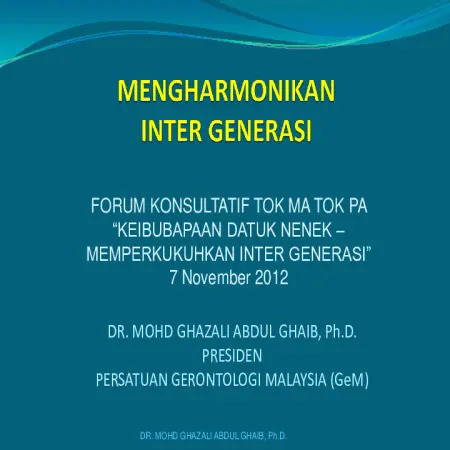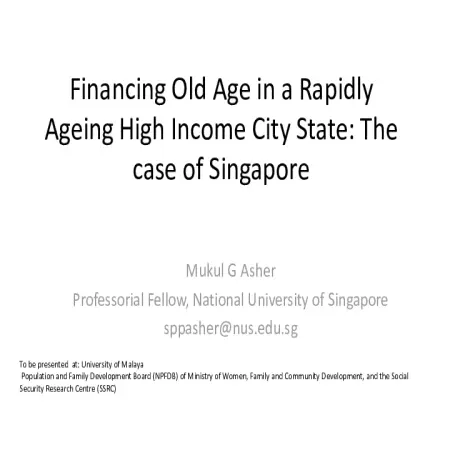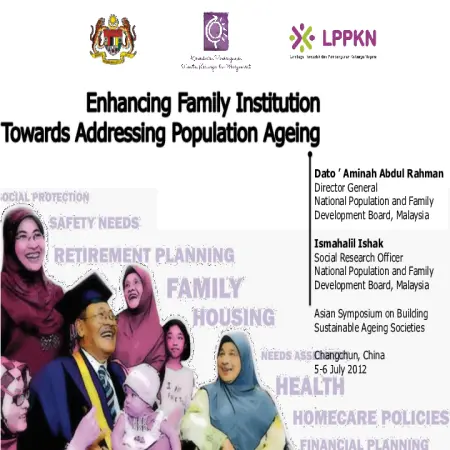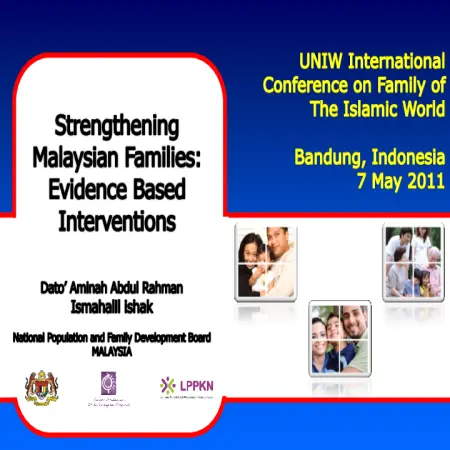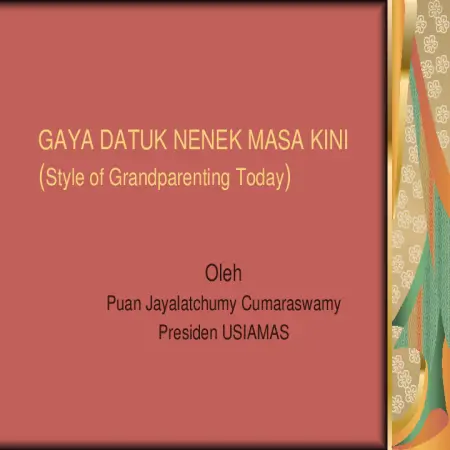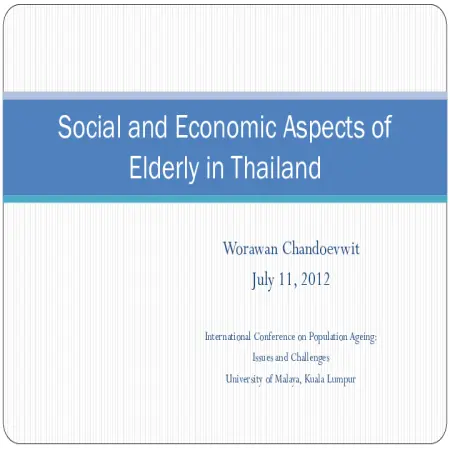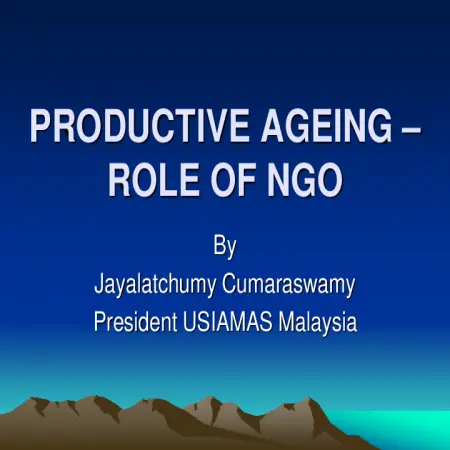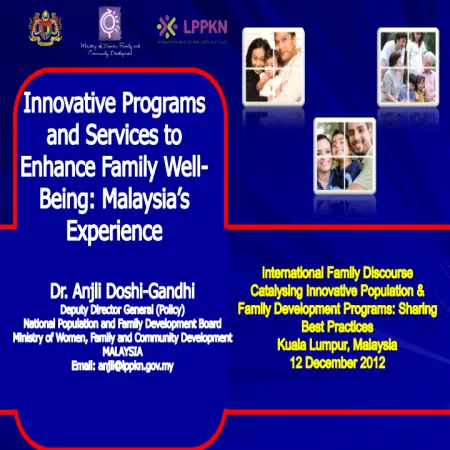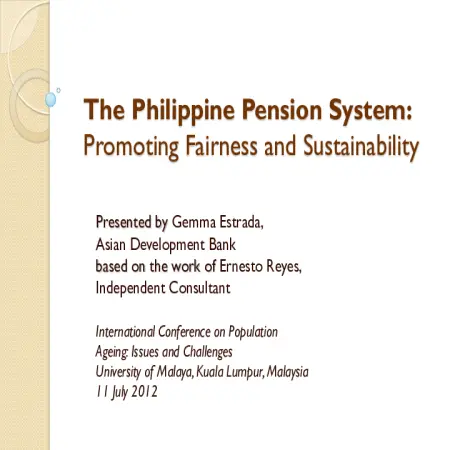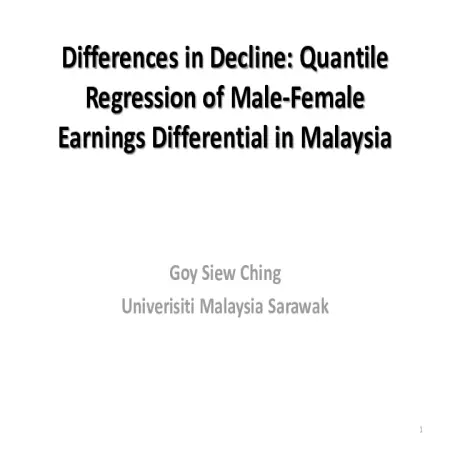Browse by Type
Results for Item type : "Conference or Workshop Item"
|
|
Mengharmonikan intergenerasi
Item Type: Conference or Workshop Item
Editor:
Year: 00/00/2012
Abstract: The purpose of the presentation is to give an overview of the differences between the older and younger generations in Malaysia and suggest some steps to bring the old and the young together. The formulation of more policies that consider the needs of the younger generation such as in sports, education, tourism, politics and media. Among the steps that can be taken to bridge the gap between the old and young is to increase public awareness of the issue aging and intergenerational unity through seminars, conferences, writings, films or hold special activities such as concerts, exhibitions, competitions video-games and others.
|
|
|
|
|
|
Financing old age in a rapidly ageing high income city state: the case of Singapore
Item Type: Conference or Workshop Item
Editor:
Year: 00/00/2012
Abstract: Singapore, an affluent city state, is among the most rapidly ageing society globally. This is due to low fertility rate (TFR of 1.2 in 2011); and increasing life expectancy (18.3 years for men and 21.8 years for women at age 65 in 2011). Its support ratio (working age persons/elderly) is projected to decline from 7.9 in 2011 to 2.2 by 2030, representing a steep decline. It primarily relies on a mandatory savings tier to finance old age. This tier is administered by a statutory Board called Central Provident Fund (CPF) under the Ministry of Manpower. The CPF has over the years been used not just for retirement, but for housing health care, and other purposes. Its wide scope and mandate has resulted in considerable complexity. This paper provides an assessment of the extent to which the current old age financing arrangements are likely to address longevity, inflation, and survivors’ risks faced by individuals in their old age. Not only each person will need support for a longer period in old age, but societal and individual expectations about old age support are also changing, reflecting the affluent society.
|
|
|
|
|
|
Enhancing family institution towards addressing population ageing
Item Type: Conference or Workshop Item
Editor:
Year: 00/00/2012
Abstract: Malaysia will be aged by the year 2030. The objective of National Policy for Older Persons, 2011 is to enhance the respect for and self-worth of the elderly in family, society and nation at the same time to develop the potential of the elderly so that they remain active and productive in national development and to create opportunities for them to continue to live independently and to encourage the establishment and the provision of specific facilities to ensure the care and protection of the elderly. The areas of Plan of Action: Promotion and Advocacy, Lifelong Learning, Safety and Protection, Governance and Shared Reasonability, Involvement and Intergenerational Solidarity, Research and Development.
|
|
|
|
|
|
Strengthening Malaysian families: evidence based interventions
Item Type: Conference or Workshop Item
Editor:
Year: 00/00/2012
Abstract: Malaysian families today are facing numerous challenges related to changing family relationships, values, need for work life balance and support systems. Some of these key challenges are as a result of a new family forms, postponement of marriage, declining fertility and effects of inflation on family economic stability. At the same time, the impact of globalization has led to different values accepted by the young. Indeed, the challenges that Malaysian families will be facing in the future will be enormous. Despite changes in the structure, families remain the most basic unit of society and this has led to the formulation of the National Family Policy (NFP). The NFP seeks to increase the family perspective in all socio-economic development design by engaging the public, private and people sectors. The Ministry of Women, Family and Community Development through National Population and Family Development Board (NPFDB), lead the family programme which includes formulation, review as well as getting the commitment of all stakeholders. Current programmes were value added based on knowledge and information from censuses, surveys, opinion polls, local views and assessment of programmes.
|
|
|
|
|
|
Gaya datuk nenek masa kini
Item Type: Conference or Workshop Item
Editor:
Year: 00/00/2012
Abstract: Based on conversative views of grandparents, grandparents are individuals who have gray hair, weak, wearing glasses and sitting on a rocking chair. Nevertheless, advances in health and socio-economic conditions have led to healthy, highly educated, still working and active seniors. Statistics show men and women spend longer time as grandparents (25years) compared to being parents with responsibilities to children (18 years). Research indicates there are substantial benefits to children interacting with grandparents. This slide presentation discuss about style of grandparenting today.
|
|
|
|
|
|
Social and economic aspects of elderly in Thailand
Item Type: Conference or Workshop Item
Editor:
Year: 00/00/2012
Abstract: Thailand is already an aging society. About 14% of population are elderly. Using a national survey, it can be shown that 16% of elderly households in the rural area have substandard living condition. The majority of elderly (60%) rely on remittance for their living. About 20% of elderly have to work for living and only 4% have government pension. Thailand is now organizing a National Saving Fund to promote saving for retirement. Another national survey finds that 80% of population want to save for their retirement but only 48% think that they can make regular monthly saving. This is consistent with another survey which finds that 50%-60% of elderly actually prepared themselves physically and mentally into the elder period. Elderly are less happy than the young. They are quite healthy, about 90% of those in the 65-74 age group can take care of themselves. It was quite normal in the Thai culture that children take care of their old parents. Above 80% of population expect that their children will take care of them physically, mentally, and financially when they become old. Taking care of old parents is something done by daughter. About 45% of elderly who are older than 94 years are taken care by daughter or daughter-in-law, another 38% take care of themselves. UN projects that Thailand will have 20 million elderly in the next 20 years which makes the elderly account for 26% of population or 45% of working age population. Without income security and long term care schemes for elderly, it would be very difficult for children to take care of their parents.
|
|
|
|
|
|
Productive aging - role of NGO
Item Type: Conference or Workshop Item
Editor:
Year: 00/00/2012
Abstract: Butler and Gleason (1985) define productive ageing as “the capacity of an individual or a population to serve in the paid workforce, to serve in volunteer activities, to assist in the family and to maintain himself or herself as independent as possible.” USIAMAS is a non-governmental organization (NGO), registered in 2002 with the Registrar of Societies. It is a non-profit and welfare related organization whose members are senior citizens themselves. USIAMAS was formed with the objectives of being a smart partner or consultant to government, corporate and other volunteer bodies who share the same mission and vision of planning, implementing, coordinating, evaluating policies, projects and programs for the wellbeing of senior citizens towards quality and meaningful life. Among the various programs run by USIAMAS to support productive ageing are seminars, capacity training programs for volunteers and with the cooperation of the Social Welfare Department of Malaysia manages an Activity Center for Senior Citizens in Kompleks Penyayang Sungai Buloh. USIAMAS was honored to be chosen by HELPAGE Korea to implement a pilot project on home-help in 2005. Home-help is a community support program aimed at ‘recruiting, developing and deploying volunteers to make regular visits as informal companions and soft-skilled caregivers to older persons staying in their homes.’The normal duties of a volunteer in a home-help program include ‘personal grooming, running errands, feeding, reminders on medication, writing letters, accompanying them on recreational activities, visit to hospitals, banks or supermarkets’ More often the mere art of listening and responding to the needs of older persons will help to overcome their feelings of ‘rejection, isolation, boredom and loneliness’. The pilot project which commenced in 2005 has now been extended to Negeri Sembilan and Melaka with the support of the Social Welfare Department of Malaysia.
|
|
|
|
|
|
Innovative programs and services to enhance family well-being: Malaysia's experience
Item Type: Conference or Workshop Item
Editor:
Year: 00/00/2012
Abstract: Families constantly face new pressures and challenges due to rapid Industrialisation, modernisation and globalisation. Globalization in general brings benefits to families but it also creates risks and challenges that must be anticipated and adapted to. Hence, we have to be alert and responsive to future challenges that families will face and equip them with the necessary knowledge, skills as well as provide the needed services. As family is the most fundamental and important social unit, commitments at the highest level should be sought. Family well-being in Malaysia has been affected positively or negatively by development. Currently, Malaysian families face many challenges as a consequence of the changes in its structure, the increase in the proportion of nuclear families and changing lifestyles. Adaptations will have to be made so as not to lose the family support system, such as for child care, care of the elderly and the infirmed. Hence, the 3P Approach (Public, Private and People) which involves the partnership of multiple stakeholders such as the government, civil society and CSOs in ensuring that the present and future generation is more peaceful, secure, tolerant, prosperous and sustainable is most paramount in nation building. There are various innovative initiatives that have been undertaken in strengthening the family institution such as the National Family Policy, 1Malaysia Family First (1MF1st) and 1 Malaysia Youth and Empowerment Support (1MYes) under the National Blue Ocean Strategy, Strengthening of Marriage Institution (SmartStart Pre-Marriage Program), 1 Stop Family Centre, family education programmes such as KASIH Modules, Parenting@Work, Smart Belanja@Lppkn, Lppkn@Community and counselling programmes. Realizing that the happiness of the people and wellbeing of the family is an important goal in becoming a high income country by 2020, the government is developing its own model of the United Nations World Happiness Index. Currently, Malaysia is placed 51st among 156 countries. Meanwhile, a National Family Wellbeing Index developed by the Ministry Of Women, Family and Community Development through the National Population and Family Development Board in 2011 found that the Family Wellbeing Index is 7.55 out of 10. The Family Well-Being (FWB) Index consists of seven domains; Family Functioning, Economy, Health, Safety, Community, Religion and Spirituality, and Housing and Environment. The FWB Index indicates that Malaysian families have a relatively high level of wellbeing but more still needs to be done.
|
|
|
|
|
|
The Philippine pension system: promoting fairness and sustainability
Item Type: Conference or Workshop Item
Editor:
Year: 00/00/2012
Abstract: This paper presentation about sharing knowledge on the retirement system in the Phillippines, currently characterized by a four-pillar structure. The first pillar refers to social assistance programs created to address the needs of the elderly poor. The second pillar covers the following mandatory defined-benefit programs: (i) the Social Security System (SSS) for private sector workers, (ii) the Government Service Insurance System (GSIS) for public sector workers, and (iii) the Armed Forces of the Philippines Retirement Service Benefit System for the military, which altogether cover about 79% of the labor force. The third pillar encompasses mandatory defined contribution programs, which can be further expanded. The fourth and final pillar covers voluntary pension programs, involving various forms of savings instrument. Because the pension system is fragmented, contributions and benefits vary depending on the program.
|
|
|
|





